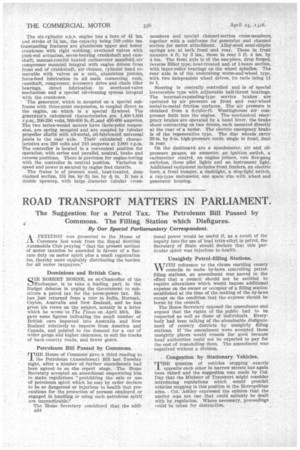ROAD TRANSPORT MATTERS IN PARLIAMENT.
Page 60

If you've noticed an error in this article please click here to report it so we can fix it.
The Suggestion for a Petrol Tax. The Petroleum Bill Passed by Commons. The Filling Station which Disfigures.
By Our Special Parliamentary Correspondent.
A PETITION was presented to the House of _L-1. Commons last week from the Royal Scottish Automobile Club praying "that the present method of motor taxation be amended in favour of a flatrate duty on motor spirit plus a small registration fee, thereby more ecinitably distributing the burden for all motor taxpayers."
Dominions and British Cars.
curt ROBERT HORNE, an ex-Chancellor of the KJExchequer, is to take a leading part in the Budget debates in urging the Government to substitute a petrol tax for the horse-power tax. He has just returned from a tour in India, Burmah, Ceylon, Australia and New Zealand, and he has given his views on the subject, notably in a letter which he wrote-to The Times on April 16th. He gave some figures indicating the small number of British ears imported into Australia and New Zealand relatively to imports from America and Canada, and pointed to the demand for a car of wider gauge and higher clearance, to suit the tracks of back-country roads, and fewer gears.
Petroleum Bill Passed by Commons.
THE of Common's. gave a third reading to 1_ the Petroletina (Ainendment) Bill last Tuesday night, after a number of further -amendments had been agreed • to on -the report stage. • The Home Secretary accepted an amendment empowering him to Make regulations ".prohibiting the sale • or use of petroleum spirit which he may by order declare to be so dangerous or injurious to health that precautions for the protection of persons employed or engaged in handling or using suds petroleum spirit
are impracticable! • • • The Home Secretary considered that the addi1334 tional power would be useful if, as a result of the inquiry into the use of lead tetra-ethyl in petrol, the Secretary of State should declare that this particular spirit was injurious to health.
Unsightly Petrol-filling Stations.
-van reference to the clause enabling county V councils to make by-laws controlling petrolfilling stations, an amendment was moved to the effect that a council should not be entitled to require alterations which would impose additional expense on the owner or occupier of a filling station• established at the time of the making of the by-laws• except on the condition that the expense should be borne by the council.
The Home Secretary opposed the amendment and argued that the rights of the public had to be respected as well as those of individuals. Everybody had been talking of the abominable disfigurement of country districts by unsightly filling stations. If the amendment were accepted those unsightly places would remain for good because local authorities could not be expected to pay for the cost of remodelling them. The amendment was negatived without a
Congestion by Stationary Vehicles.
rpnE question of vehicles stopping exactly opposite each other in narrow streets has again been raised and the suggestion was made by Col. Day that the Minister of Transport might consider introducing regulations which would prohibit vehicles stopping in this position in the Metropolitan area. Col. Ashley expressed the opinion that the matter was not one that could suitably be dealt with by regulation. Where necessary, proceedings could be taken for obstruction.




















































































































